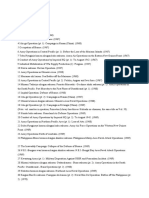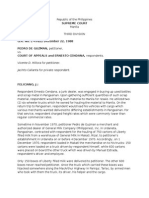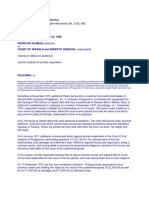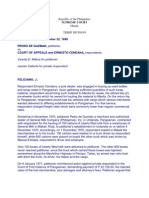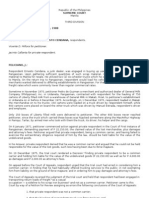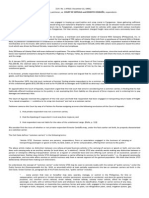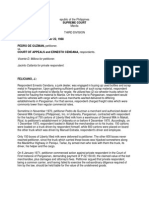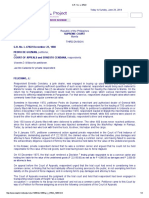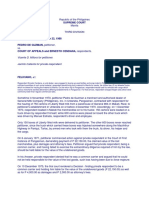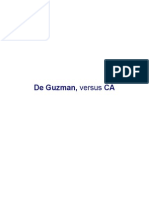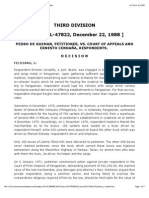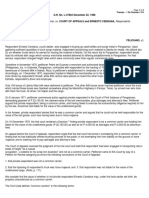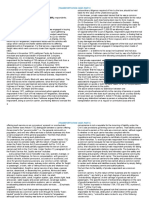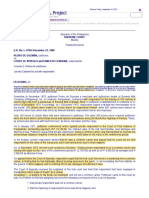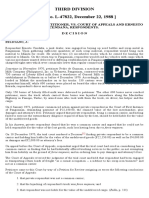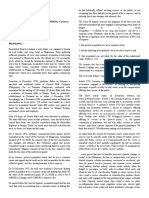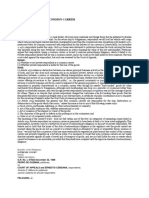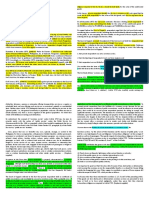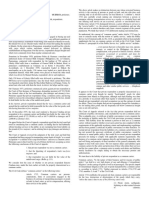De Guzman v. Court of Appeals
De Guzman v. Court of Appeals
Uploaded by
Meet MeatCopyright:
Available Formats
De Guzman v. Court of Appeals
De Guzman v. Court of Appeals
Uploaded by
Meet MeatOriginal Description:
Original Title
Copyright
Available Formats
Share this document
Did you find this document useful?
Is this content inappropriate?
Copyright:
Available Formats
De Guzman v. Court of Appeals
De Guzman v. Court of Appeals
Uploaded by
Meet MeatCopyright:
Available Formats
Transportation Laws Tests and Characteristics
Republic of the Philippines
SUPREME COURT
Manila
THIRD DIVISION
G.R. No. L-47822 December 22, 1988
PEDRO DE GUZMAN, petitioner,
vs.
COURT OF APPEALS and ERNESTO
CENDANA, respondents.
Vicente D. Millora for petitioner.
Jacinto Callanta for private respondent.
FELICIANO, J.:
Respondent Ernesto Cendana, a junk dealer, was engaged in
buying up used bottles and scrap metal in Pangasinan. Upon
gathering sufficient quantities of such scrap material,
respondent would bring such material to Manila for resale. He
utilized two (2) six-wheeler trucks which he owned for hauling
the material to Manila. On the return trip to Pangasinan,
respondent would load his vehicles with cargo which various
merchants wanted delivered to differing establishments in
Pangasinan. For that service, respondent charged freight rates
which were commonly lower than regular commercial rates.
Sometime in November 1970, petitioner Pedro de Guzman a
merchant and authorized dealer of General Milk Company
(Philippines), Inc. in Urdaneta, Pangasinan, contracted with
respondent for the hauling of 750 cartons of Liberty filled milk
from a warehouse of General Milk in Makati, Rizal, to
petitioner's establishment in Urdaneta on or before 4
December 1970. Accordingly, on 1 December 1970,
respondent loaded in Makati the merchandise on to his trucks:
150 cartons were loaded on a truck driven by respondent
himself, while 600 cartons were placed on board the other
truck which was driven by Manuel Estrada, respondent's driver
and employee.
Only 150 boxes of Liberty filled milk were delivered to
petitioner. The other 600 boxes never reached petitioner, since
the truck which carried these boxes was hijacked somewhere
along the MacArthur Highway in Paniqui, Tarlac, by armed
men who took with them the truck, its driver, his helper and the
cargo.
1|Page
On 6 January 1971, petitioner commenced action against
private respondent in the Court of First Instance of
Pangasinan, demanding payment of P 22,150.00, the claimed
value of the lost merchandise, plus damages and attorney's
fees. Petitioner argued that private respondent, being a
common carrier, and having failed to exercise the
extraordinary diligence required of him by the law, should be
held liable for the value of the undelivered goods.
In his Answer, private respondent denied that he was a
common carrier and argued that he could not be held
responsible for the value of the lost goods, such loss having
been due to force majeure.
On 10 December 1975, the trial court rendered a
Decision 1 finding private respondent to be a common carrier
and holding him liable for the value of the undelivered goods
(P 22,150.00) as well as for P 4,000.00 as damages and P
2,000.00 as attorney's fees.
On appeal before the Court of Appeals, respondent urged that
the trial court had erred in considering him a common carrier;
in finding that he had habitually offered trucking services to the
public; in not exempting him from liability on the ground
of force majeure; and in ordering him to pay damages and
attorney's fees.
The Court of Appeals reversed the judgment of the trial court
and held that respondent had been engaged in transporting
return loads of freight "as a casual occupation a sideline to
his scrap iron business" and not as a common carrier.
Petitioner came to this Court by way of a Petition for Review
assigning as errors the following conclusions of the Court of
Appeals:
1. that private respondent was not a
common carrier;
2. that the hijacking of respondent's truck
was force majeure; and
3. that respondent was not liable for the
value of the undelivered cargo. (Rollo, p.
111)
We consider first the issue of whether or not private
respondent Ernesto Cendana may, under the facts earlier set
forth, be properly characterized as a common carrier.
The Civil Code defines "common carriers" in the following
terms:
Transportation Laws Tests and Characteristics
Article 1732. Common carriers are persons,
corporations, firms or associations engaged
in the business of carrying or transporting
passengers or goods or both, by land, water,
or air for compensation, offering their
services to the public.
The above article makes no distinction between one
whose principal business activity is the carrying of persons or
goods or both, and one who does such carrying only as
an ancillary activity (in local Idiom as "a sideline"). Article 1732
also carefully avoids making any distinction between a person
or enterprise offering transportation service on a regular or
scheduled basis and one offering such service on
an occasional, episodic or unscheduled basis. Neither does
Article 1732 distinguish between a carrier offering its services
to the "general public," i.e., the general community or
population, and one who offers services or solicits business
only from a narrow segment of the general population. We
think that Article 1733 deliberaom making such distinctions.
So understood, the concept of "common carrier" under Article
1732 may be seen to coincide neatly with the notion of "public
service," under the Public Service Act (Commonwealth Act No.
1416, as amended) which at least partially supplements the
law on common carriers set forth in the Civil Code. Under
Section 13, paragraph (b) of the Public Service Act, "public
service" includes:
... every person that now or hereafter may
own, operate, manage, or control in the
Philippines, for hire or compensation, with
general or limited clientele, whether
permanent, occasional or accidental, and
done for general business purposes, any
common carrier, railroad, street railway,
traction railway, subway motor vehicle, either
for freight or passenger, or both, with or
without fixed route and whatever may be its
classification, freight or carrier service of any
class, express service, steamboat, or
steamship line, pontines, ferries and water
craft, engaged in the transportation of
passengers or freight or both, shipyard,
marine repair shop, wharf or dock, ice plant,
ice-refrigeration plant, canal, irrigation
system, gas, electric light, heat and power,
water supply and power petroleum,
sewerage system, wire or wireless
communications systems, wire or wireless
broadcasting stations and other similar
public services. ... (Emphasis supplied)
2|Page
It appears to the Court that private respondent is properly
characterized as a common carrier even though he merely
"back-hauled" goods for other merchants from Manila to
Pangasinan, although such back-hauling was done on a
periodic or occasional rather than regular or scheduled
manner, and even though private respondent's
principal occupation was not the carriage of goods for others.
There is no dispute that private respondent charged his
customers a fee for hauling their goods; that fee frequently fell
below commercial freight rates is not relevant here.
The Court of Appeals referred to the fact that private
respondent held no certificate of public convenience, and
concluded he was not a common carrier. This is palpable error.
A certificate of public convenience is not a requisite for the
incurring of liability under the Civil Code provisions governing
common carriers. That liability arises the moment a person or
firm acts as a common carrier, without regard to whether or not
such carrier has also complied with the requirements of the
applicable regulatory statute and implementing regulations and
has been granted a certificate of public convenience or other
franchise. To exempt private respondent from the liabilities of a
common carrier because he has not secured the necessary
certificate of public convenience, would be offensive to sound
public policy; that would be to reward private respondent
precisely for failing to comply with applicable statutory
requirements. The business of a common carrier impinges
directly and intimately upon the safety and well being and
property of those members of the general community who
happen to deal with such carrier. The law imposes duties and
liabilities upon common carriers for the safety and protection of
those who utilize their services and the law cannot allow a
common carrier to render such duties and liabilities merely
facultative by simply failing to obtain the necessary permits
and authorizations.
We turn then to the liability of private respondent as a common
carrier.
Common carriers, "by the nature of their business and for
reasons of public policy" 2 are held to a very high degree of
care and diligence ("extraordinary diligence") in the carriage of
goods as well as of passengers. The specific import of
extraordinary diligence in the care of goods transported by a
common carrier is, according to Article 1733, "further
expressed in Articles 1734,1735 and 1745, numbers 5, 6 and
7" of the Civil Code.
Article 1734 establishes the general rule that common carriers
are responsible for the loss, destruction or deterioration of the
goods which they carry, "unless the same is due to any of the
following causes only:
Transportation Laws Tests and Characteristics
(1) Flood, storm,
earthquake, lightning or
other natural disaster or
calamity;
(2) Act of the public enemy
in war, whether
international or civil;
(3) Act or omission of the
shipper or owner of the
goods;
(4) The character-of the
goods or defects in the
packing or-in the
containers; and
(5) Order or act of
competent public authority.
It is important to point out that the above list of causes of loss,
destruction or deterioration which exempt the common carrier
for responsibility therefor, is a closed list. Causes falling
outside the foregoing list, even if they appear to constitute a
species of force majeure fall within the scope of Article 1735,
which provides as follows:
In all cases other than those mentioned in
numbers 1, 2, 3, 4 and 5 of the preceding
article, if the goods are lost, destroyed or
deteriorated, common carriers are
presumed to have been at fault or to have
acted negligently, unless they prove that
they observed extraordinary diligence as
required in Article 1733. (Emphasis supplied)
Applying the above-quoted Articles 1734 and 1735, we note
firstly that the specific cause alleged in the instant case the
hijacking of the carrier's truck does not fall within any of the
five (5) categories of exempting causes listed in Article 1734. It
would follow, therefore, that the hijacking of the carrier's
vehicle must be dealt with under the provisions of Article 1735,
in other words, that the private respondent as common carrier
is presumed to have been at fault or to have acted negligently.
This presumption, however, may be overthrown by proof of
extraordinary diligence on the part of private respondent.
Petitioner insists that private respondent had not observed
extraordinary diligence in the care of petitioner's goods.
Petitioner argues that in the circumstances of this case, private
respondent should have hired a security guard presumably to
ride with the truck carrying the 600 cartons of Liberty filled
milk. We do not believe, however, that in the instant case, the
standard of extraordinary diligence required private
respondent to retain a security guard to ride with the truck and
to engage brigands in a firelight at the risk of his own life and
the lives of the driver and his helper.
The precise issue that we address here relates to the specific
requirements of the duty of extraordinary diligence in the
vigilance over the goods carried in the specific context of
hijacking or armed robbery.
As noted earlier, the duty of extraordinary diligence in the
vigilance over goods is, under Article 1733, given additional
specification not only by Articles 1734 and 1735 but also by
Article 1745, numbers 4, 5 and 6, Article 1745 provides in
relevant part:
Any of the following or similar stipulations
shall be considered unreasonable, unjust
and contrary to public policy:
xxx xxx xxx
(5) that the common
carrier shall not be
responsible for the acts or
omissions of his or its
employees;
(6) that the common
carrier's liability for acts
committed by thieves, or
of robbers who donot act
with grave or
irresistible threat, violence
or force, is dispensed with
or diminished; and
(7) that the common
carrier shall not
responsible for the loss,
destruction or
deterioration of goods on
account of the defective
condition of the car
vehicle, ship, airplane or
other equipment used in
3|Page
Transportation Laws Tests and Characteristics
the contract of carriage.
(Emphasis supplied)
Under Article 1745 (6) above, a common carrier is held
responsible and will not be allowed to divest or to diminish
such responsibility even for acts of strangers like thieves or
robbers, except where such thieves or robbers in fact acted
"with grave or irresistible threat, violence or force." We believe
and so hold that the limits of the duty of extraordinary diligence
in the vigilance over the goods carried are reached where the
goods are lost as a result of a robbery which is attended by
"grave or irresistible threat, violence or force."
In the instant case, armed men held up the second truck
owned by private respondent which carried petitioner's cargo.
The record shows that an information for robbery in band was
filed in the Court of First Instance of Tarlac, Branch 2, in
Criminal Case No. 198 entitled "People of the Philippines v.
Felipe Boncorno, Napoleon Presno, Armando Mesina, Oscar
Oria and one John Doe." There, the accused were charged
with willfully and unlawfully taking and carrying away with them
the second truck, driven by Manuel Estrada and loaded with
the 600 cartons of Liberty filled milk destined for delivery at
petitioner's store in Urdaneta, Pangasinan. The decision of the
trial court shows that the accused acted with grave, if not
irresistible, threat, violence or force. 3 Three (3) of the five (5)
hold-uppers were armed with firearms. The robbers not only
took away the truck and its cargo but also kidnapped the driver
and his helper, detaining them for several days and later
releasing them in another province (in Zambales). The
hijacked truck was subsequently found by the police in
Quezon City. The Court of First Instance convicted all the
accused of robbery, though not of robbery in band. 4
In these circumstances, we hold that the occurrence of the
loss must reasonably be regarded as quite beyond the control
of the common carrier and properly regarded as a fortuitous
event. It is necessary to recall that even common carriers are
4|Page
not made absolute insurers against all risks of travel and of
transport of goods, and are not held liable for acts or events
which cannot be foreseen or are inevitable, provided that they
shall have complied with the rigorous standard of extraordinary
diligence.
We, therefore, agree with the result reached by the Court of
Appeals that private respondent Cendana is not liable for the
value of the undelivered merchandise which was lost because
of an event entirely beyond private respondent's control.
ACCORDINGLY, the Petition for Review on certiorari is hereby
DENIED and the Decision of the Court of Appeals dated 3
August 1977 is AFFIRMED. No pronouncement as to costs.
SO ORDERED.
Fernan, C.J., Gutierrez, Jr., Bidin and Cortes, JJ., concur.
Footnotes
1 Rollo, p. 14.
2 Article 1733, Civil Code.
3 Rollo, p. 22.
4 The evidence of the prosecution did not
show that more than three (3) of the five (5)
hold-uppers were armed. Thus, the
existence of a "band" within the technical
meaning of Article 306 of the Revised Penal
Code, was not affirmatively proved by the
prosecution.
You might also like
- Senshi SoshoDocument6 pagesSenshi SoshoMoosterhaut0% (1)
- Digest Mabanag Vs Lopez VitoDocument1 pageDigest Mabanag Vs Lopez VitoMeet Meat100% (2)
- By The People: A History of The United StatesDocument36 pagesBy The People: A History of The United StatesAlan DukeNo ratings yet
- Blur Tender Chords TabDocument2 pagesBlur Tender Chords TabMarko JakNo ratings yet
- Transpo CasesDocument159 pagesTranspo CasesErold John Salvador BuenaflorNo ratings yet
- Vicente D. Millora For Petitioner. Jacinto Callanta For Private RespondentDocument16 pagesVicente D. Millora For Petitioner. Jacinto Callanta For Private RespondentAgnes GamboaNo ratings yet
- Supreme Court: Vicente D. Millora For Petitioner. Jacinto Callanta For Private RespondentDocument29 pagesSupreme Court: Vicente D. Millora For Petitioner. Jacinto Callanta For Private RespondentamielguimNo ratings yet
- Vicente D. Millora For Petitioner. Jacinto Callanta For Private RespondentDocument83 pagesVicente D. Millora For Petitioner. Jacinto Callanta For Private RespondentJenely Joy Areola-TelanNo ratings yet
- Cases 1732,1733,1766Document83 pagesCases 1732,1733,1766Jenely Joy Areola-TelanNo ratings yet
- Transpo Cases Part 2Document37 pagesTranspo Cases Part 2Jay SuarezNo ratings yet
- Supreme Court: Vicente D. Millora For Petitioner. Jacinto Callanta For Private RespondentDocument60 pagesSupreme Court: Vicente D. Millora For Petitioner. Jacinto Callanta For Private RespondentDominic M. CerbitoNo ratings yet
- Common Carriers in General TranspoDocument96 pagesCommon Carriers in General Transporgomez_940509No ratings yet
- De Guzman vs. Court of AppealsDocument4 pagesDe Guzman vs. Court of Appealsmamp05No ratings yet
- Fulltxt 1Document91 pagesFulltxt 1Don SumiogNo ratings yet
- Vicente D. Millora For Petitioner. Jacinto Callanta For Private RespondentDocument24 pagesVicente D. Millora For Petitioner. Jacinto Callanta For Private Respondentchard apolloNo ratings yet
- de Guzman Vs CA 168 Scra 612Document4 pagesde Guzman Vs CA 168 Scra 612Ciro100% (1)
- Vicente D. Millora For Petitioner. Jacinto Callanta For Private RespondentDocument28 pagesVicente D. Millora For Petitioner. Jacinto Callanta For Private RespondentRon AceroNo ratings yet
- PEDRO DE GUZMAN, Petitioner, Court of Appeals and Ernesto Cendana, RespondentsDocument20 pagesPEDRO DE GUZMAN, Petitioner, Court of Appeals and Ernesto Cendana, RespondentsFBNo ratings yet
- De Guzman vs. CADocument6 pagesDe Guzman vs. CADavid Lawrenz SamonteNo ratings yet
- TRANSPO First Set of CasesDocument62 pagesTRANSPO First Set of CasesDMMCorrespondent Lady BelleNo ratings yet
- Cases in Law of TransportationDocument11 pagesCases in Law of TransportationWerner SchlagerNo ratings yet
- 6 - de Guzman Vs CADocument3 pages6 - de Guzman Vs CAJamica Claire QuibodNo ratings yet
- Transportation Law Cases (Art. 1732)Document97 pagesTransportation Law Cases (Art. 1732)Macky CaballesNo ratings yet
- Transpo CasesDocument273 pagesTranspo CasesJohn Charel Sabandal PongaseNo ratings yet
- 1 de Guzman v. CADocument4 pages1 de Guzman v. CAKim Laurente-AlibNo ratings yet
- Transpo Cases 01-10Document41 pagesTranspo Cases 01-10Krissie GuevaraNo ratings yet
- Transpo Re V Cases 2014-2015Document242 pagesTranspo Re V Cases 2014-2015Mitzi PerdidoNo ratings yet
- Transpo Full Text Cases Batch1Document395 pagesTranspo Full Text Cases Batch1AikeeBeltranNo ratings yet
- Transpo 1-6 CasesDocument47 pagesTranspo 1-6 CasesRaf RufNo ratings yet
- G.R. No. L-47822 December 22, 1988 PEDRO DE GUZMAN, PetitionerDocument24 pagesG.R. No. L-47822 December 22, 1988 PEDRO DE GUZMAN, PetitionerJoan ChristineNo ratings yet
- Vicente D. Millora For Petitioner. Jacinto Callanta For Private RespondentDocument27 pagesVicente D. Millora For Petitioner. Jacinto Callanta For Private RespondentMary Fatima BerongoyNo ratings yet
- TL - de Guzman vs. CA, GR No. L-47822, Dec. 22, 1988Document4 pagesTL - de Guzman vs. CA, GR No. L-47822, Dec. 22, 1988Jec Luceriaga BiraquitNo ratings yet
- De GuzmanDocument8 pagesDe GuzmanMuji JaafarNo ratings yet
- Pedro de Guzman Vs CaDocument11 pagesPedro de Guzman Vs CaSor ElleNo ratings yet
- Vicente D. Millora For Petitioner. Jacinto Callanta For Private RespondentDocument4 pagesVicente D. Millora For Petitioner. Jacinto Callanta For Private RespondentSamantha Bonilla BaricauaNo ratings yet
- De GuzmanDocument7 pagesDe GuzmanlovesresearchNo ratings yet
- Transpo Cases 14 20Document23 pagesTranspo Cases 14 20Mary Fatima BerongoyNo ratings yet
- Transpo HW Nov16 Full CaseDocument42 pagesTranspo HW Nov16 Full CasezippyNo ratings yet
- (CASE NO.1) : Transportation LawDocument119 pages(CASE NO.1) : Transportation LawGrester FernandezNo ratings yet
- Galvo Vs UCPBDocument3 pagesGalvo Vs UCPBJuris FormaranNo ratings yet
- A. Common Carrier in General (Cases)Document81 pagesA. Common Carrier in General (Cases)paoNo ratings yet
- Transpo CaseDocument4 pagesTranspo CasePatrice ThiamNo ratings yet
- (Transporttation Cases Part I) : Vicente D. Millora For Petitioner. Jacinto Callanta For Private RespondentDocument48 pages(Transporttation Cases Part I) : Vicente D. Millora For Petitioner. Jacinto Callanta For Private RespondentTet VergaraNo ratings yet
- De Guzman V. CADocument3 pagesDe Guzman V. CABalaod MaricorNo ratings yet
- 1 - de Guzman v. Court of Appeals, G.R. No. L-47822, 22 December 1988, (168 SCRA 612)Document4 pages1 - de Guzman v. Court of Appeals, G.R. No. L-47822, 22 December 1988, (168 SCRA 612)BryanNo ratings yet
- (G.R. No. L-47822, December 22, 1988)Document4 pages(G.R. No. L-47822, December 22, 1988)Jasmin RodriguezNo ratings yet
- A1. de Guzman Vs CADocument4 pagesA1. de Guzman Vs CAMarion Yves MosonesNo ratings yet
- de Guzman vs. Court of AppealsDocument3 pagesde Guzman vs. Court of AppealsJon Raymer OclaritNo ratings yet
- de Guzaman V CaDocument4 pagesde Guzaman V CaOmar sarmientoNo ratings yet
- Transportation CasesDocument154 pagesTransportation CasesRen RenNo ratings yet
- De Guzman Vs CA - G.R. No. L-47822. December 22, 1988Document6 pagesDe Guzman Vs CA - G.R. No. L-47822. December 22, 1988Ebbe DyNo ratings yet
- Print TodayDocument30 pagesPrint TodaySamantha Bonilla BaricauaNo ratings yet
- Transpo Law Case Digests 1Document6 pagesTranspo Law Case Digests 1Anna TanNo ratings yet
- Transpo Cases ADocument133 pagesTranspo Cases AJenMarlon Corpuz AquinoNo ratings yet
- De Guzman Vs CADocument9 pagesDe Guzman Vs CAPaolo Antonio EscalonaNo ratings yet
- de Guzman v. Court of Appeals PDFDocument10 pagesde Guzman v. Court of Appeals PDFd-fbuser-49417072No ratings yet
- Transpo Cases 1Document203 pagesTranspo Cases 1Ariel Mark PilotinNo ratings yet
- And Done For General Business Purposes, Any Common Carrier, Railroad, Street Railway, Traction RailwayDocument39 pagesAnd Done For General Business Purposes, Any Common Carrier, Railroad, Street Railway, Traction RailwayD Del SalNo ratings yet
- Transpo Cases 2Document35 pagesTranspo Cases 2Nicole Ann Delos ReyesNo ratings yet
- Case Digest 1st MeetingDocument8 pagesCase Digest 1st MeetinggabbieseguiranNo ratings yet
- Third Division: Syllabus SyllabusDocument7 pagesThird Division: Syllabus SyllabusAggy AlbotraNo ratings yet
- Transportation Law Full TextsDocument40 pagesTransportation Law Full TextsLouis pNo ratings yet
- The Economic Policies of Alexander Hamilton: Works & Speeches of the Founder of American Financial SystemFrom EverandThe Economic Policies of Alexander Hamilton: Works & Speeches of the Founder of American Financial SystemNo ratings yet
- Magboo v. BernardoDocument2 pagesMagboo v. BernardoMeet MeatNo ratings yet
- Francisco vs. NLRC (GR. No.170087 Aug. 31, 2006)Document11 pagesFrancisco vs. NLRC (GR. No.170087 Aug. 31, 2006)Meet MeatNo ratings yet
- 2015 Taxation Law - Atty Noel Ortega PDFDocument28 pages2015 Taxation Law - Atty Noel Ortega PDFViner VillariñaNo ratings yet
- Crisostomo v. Court of AppealsDocument5 pagesCrisostomo v. Court of AppealsMeet MeatNo ratings yet
- Tolentino vs. ComelecDocument37 pagesTolentino vs. ComelecMeet MeatNo ratings yet
- Imbong vs. ComelecDocument13 pagesImbong vs. ComelecMeet MeatNo ratings yet
- Ultra Trail RunningDocument18 pagesUltra Trail RunningMeet MeatNo ratings yet
- Consti Cases June 8Document1,158 pagesConsti Cases June 8Meet MeatNo ratings yet
- Gonzalez vs. ComelecDocument15 pagesGonzalez vs. ComelecMeet MeatNo ratings yet
- Consti Wave 3 DigestDocument4 pagesConsti Wave 3 DigestMeet MeatNo ratings yet
- Succession - Main Reviewer 102-112Document11 pagesSuccession - Main Reviewer 102-112Meet MeatNo ratings yet
- Consti Cases June 8Document1,158 pagesConsti Cases June 8Meet MeatNo ratings yet
- Civil Script 3Document28 pagesCivil Script 3Meet MeatNo ratings yet
- Civil Script 2Document22 pagesCivil Script 2Meet MeatNo ratings yet
- Civil Script 1 PDFDocument23 pagesCivil Script 1 PDFMeet MeatNo ratings yet
- LabRel General Milling Corporation v. CADocument2 pagesLabRel General Milling Corporation v. CAMeet MeatNo ratings yet
- Proposed Amendments To The 1987 Constitution of The Republic of The PhilippinesDocument67 pagesProposed Amendments To The 1987 Constitution of The Republic of The Philippinesjoahn rocreoNo ratings yet
- CIRCULAR NO. 2020-004: Social Security SystemDocument2 pagesCIRCULAR NO. 2020-004: Social Security SystemMarck GoNo ratings yet
- Tomimbang V TomimbangDocument11 pagesTomimbang V TomimbangChristiane Marie BajadaNo ratings yet
- Car Rental Agreement Template Free Word DocumentDocument4 pagesCar Rental Agreement Template Free Word DocumentKatherine LippertNo ratings yet
- Descriptive Writing - PeopleDocument11 pagesDescriptive Writing - PeopleJoline Tang Imm LeeNo ratings yet
- Iloilo City Regulation Ordinance 2012-035Document2 pagesIloilo City Regulation Ordinance 2012-035Iloilo City CouncilNo ratings yet
- Conforme Draft (Clinic)Document4 pagesConforme Draft (Clinic)qwertyuiopkmrrNo ratings yet
- Hamlet and FortinbrasDocument27 pagesHamlet and Fortinbrasnavingunaratnam77No ratings yet
- Sunday School 03 - 09-2023Document1 pageSunday School 03 - 09-2023admissionNo ratings yet
- Mary Maloney - Lamb To SlaughterDocument1 pageMary Maloney - Lamb To SlaughterGourav Bose100% (1)
- Sorylian Collective: and Veydreth TribesDocument11 pagesSorylian Collective: and Veydreth TribesKeith Maki LeeNo ratings yet
- WEB Du Bois - Color and Democracy - ExcerptsDocument39 pagesWEB Du Bois - Color and Democracy - Excerptsyrzh8xj797No ratings yet
- An Analysis of The Historical Effectiveness of Anti-Ship Cruise Missiles in Littoral WarfareDocument67 pagesAn Analysis of The Historical Effectiveness of Anti-Ship Cruise Missiles in Littoral WarfareHarold_Godwinson100% (1)
- Nomination Form: Form To A Service CentreDocument2 pagesNomination Form: Form To A Service Centrejha.sofcon5941No ratings yet
- Cordora V COMELEC Feb 19, 2009Document2 pagesCordora V COMELEC Feb 19, 2009Maria Lourdes DatorNo ratings yet
- JULIUS S. WATLER v. STATE OF TENNESSEEDocument4 pagesJULIUS S. WATLER v. STATE OF TENNESSEEmary engNo ratings yet
- Course Outlines - Sem V - ADR (Clinical)Document11 pagesCourse Outlines - Sem V - ADR (Clinical)SUDHANSHU SINGHNo ratings yet
- SD 12.1 03 Kjulavkova, K. - From Cultural To Political HegemonismDocument14 pagesSD 12.1 03 Kjulavkova, K. - From Cultural To Political HegemonismBorjan AdziskiNo ratings yet
- BaburDocument15 pagesBaburLucasNo ratings yet
- (2010) Zasca 120Document10 pages(2010) Zasca 120Jei Essa AlmiasNo ratings yet
- Rubi Li v. SolimanDocument2 pagesRubi Li v. Solimanmiles1280No ratings yet
- IDT Last Day Revision Notes Free VersionDocument11 pagesIDT Last Day Revision Notes Free Versionmanognap33No ratings yet
- Dialogue List - Dialogue Continuity (Sample) : Act OneDocument1 pageDialogue List - Dialogue Continuity (Sample) : Act OneSantisalcedospNo ratings yet
- 06 Bushfire Hazard Overlay MapsDocument3 pages06 Bushfire Hazard Overlay MapsCarlos D. GuiradosNo ratings yet
- Maceda Law: Sale of Immovable Property Ra 6552 Real PropertyDocument5 pagesMaceda Law: Sale of Immovable Property Ra 6552 Real PropertyRia GayleNo ratings yet
- Department Order No. 40 B 03 Series of 2003 February 16 2004Document2 pagesDepartment Order No. 40 B 03 Series of 2003 February 16 2004nido12No ratings yet
- Fatuh Al Ghaib Urdu by Sh. Gilani R.A Urdu TranslationDocument167 pagesFatuh Al Ghaib Urdu by Sh. Gilani R.A Urdu TranslationSHAHID FAROOQ100% (4)
